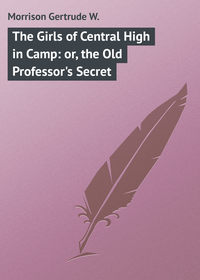 полная версия
полная версияThe Girls of Central High on Track and Field
“Give it up. What’s the answer?” asked Dora Lockwood, directly behind her.
“Luck is a foolish thing – or a belief in it is,” complained Bobby. “List to my tale of woe:
“Why wear a rabbit foot for luckOr nail a horseshoe on the sill?For if upon the ice you slipYou’ll surely get a spill.“Why cross your fingers in the darkTo keep the witches from your track,When if, in getting out of bed,You step upon a tack?”“Don’t sing us any more doggerel, but lead on!” commanded Laura.
Bobby was first at the dead tree. There she stopped, not for breath, but because, below her, in a sheltered hollow, where a spring drifted away across a grassy lawn, there was an encampment. She held up her hand and motioned for silence.
There were three large, covered wagons such is Gypsies usually drive. A dozen horses were tethered where the young grass was particularly lush. A fire over which a big kettle of some savory stew bubbled, burned in the midst of the encampment. There were two gaudily painted canvas tents staked on the green, too, although from the opened doors of the wagons it was evident that the Gypsies, at this time of year, mainly lived within their vehicles.
“Oh!” exclaimed Bobby, when the other girls were crowding about her, and looking as hard as she was at the camp. “This is what the girl we saw, ran away from.”
CHAPTER IV – THE GYPSY QUEEN
“Isn’t that romantic?” cried Jess, under her breath. “Wouldn’t you like to live in the open like that, Laura?”
“Sometimes. Then again I might want a steam-heated house,” laughed Mother Wit.
“And see that darling little baby!” gasped Nellie Agnew, as a little fellow in gay apparel ran out of one of the tents.
A young woman followed him. She had black hair, and very black eyes, and wore a necklace, and earrings, and bracelets galore. When she ran after the crowing little one the tinkling of these ornaments was audible to the group of girls on the hillside.
This gaily dressed woman caught up the laughing child, and as she turned her gaze went over his head and struck full upon the seven girls.
She set the little boy down quietly, said something to him, and he ran to cover like a frightened chicken. She spoke another word – aloud – and two men and three other women appeared from the wagons, or tents. They all gazed up at the half-frightened girls.
“Come down, pretty young ladies,” said the gaily bedecked Gypsy woman, in a wheedling tone. “We will not harm you. If you cross our palms with silver we may be able to tell you something pleasant.”
She spoke English well enough; but her address mainly was a formula used; to attract trade.
“What’ll we do?” gasped Dorothy Lockwood, clinging to her twin’s hand.
“Keep your courage, Dorry,” said her sister.
“Don’t let them see we’re afraid of them,” Nellie advised, but in a shaking voice.
“And why should we be afraid?” asked Laura, quite calmly.
“Oh, I’ve seen that woman before,” said Eve. “She’s one of the Vareys. They are English Gypsies, like the Stanleys. She was at our place last summer.”
She started down the steep hillside into the camp. The first Gypsy woman said something in the Romany dialect to the others, and the men drifted away, only the woman awaiting the coming of the girls of Central High.
As the seven friends approached they saw that the Varey woman was very handsome, in her bold, dark way. Silver ornaments were entwined in her coarse, blue-black hair; her dress, though garish in color, was neat and of rich material. The bangle, bracelets, necklace and all were either of silver or gold – no sham about them, as Laura Belding very well knew, her father being a jeweler and she knowing something about good jewelry.
“She’s queen of the tribe,” whispered Eve to Laura. “And her husband, Jim Varey, is leader of this clan. He is a horse trader, and sells oilcloth and tinware, while the women sell baskets, and the like, and pick up a quarter now and then telling fortunes.”
“Oh, Eve!” whispered Jess, behind, “did you ever have your fortune told?”
“Yes. It’s silly,” replied Eve, flushing.
“It would be lots of fun,” said Bobby, quite as eager as Jess.
“Let’s all do it,” urged Nellie. “If we give them a little money they probably will not molest us.”
“They wouldn’t dare trouble us, anyway,” said Eve. “And why should they?”
But the other girls, who were not so well acquainted with the Romany people, felt that the adventure in the Gypsy camp promised much excitement. In a minute they were all on the greensward in front of the tent of the Gypsy queen.
“Cross the poor Gypsy’s palm with silver,” whined Grace Varey, in a wheedling tone, “and each of you shall learn what the future has in store for you.”
“Suppose you can’t tell us anything pleasant?” said Bobby Hargrew, boldly. “Then we’d rather not know it.”
“But such pretty little ladies are bound to have pretty fortunes,” replied the Romany woman. “Come! for a shilling – two shillings, in your American money – I will tell you each what you want to know most.”
“You will?”
“Yes, indeed, for but two shillings in your American money.”
“She means a quarter,” said Eve.
“You try it first, Mother Wit,” urged Nellie, nudging Laura.
At the words Grace Varey looked sharply at Laura Belding’s earnest face and thoughtful gray eyes. Instantly she said:
“You do not fear. You lead these others. You have a quick mind and you invent things. You are usually first in everything; but power does not spoil you. You win love as well as admiration – there is a difference. You have parents and at least one brother. You have no sister. There is a – ” She shut her eyes for a moment, and hesitated. “There is a black person – a woman – who has something to do with you – ”
“Beware of the ‘black man coming with a bundle,’” hissed Bobby, giggling.
“Hush!” exclaimed Jess. “She means Mammy Jinny, Laura’s old nurse.”
Grace Varey had turned swiftly to the scoffing Bobby, and she pointed at her with an accusing finger.
“You do not believe,” she said, quickly. “You are light and thoughtless. You have been spoiled by a doting father. You have no mother – poor child! You are very frivolous and light-hearted; but a great sorrow is coming into your life soon. Into your school life, I believe. It is connected with one of your teachers – a woman. Beware!”
Now, this was very melodramatic; but Bobby, for some reason, could not laugh at it. The woman was too much in earnest. Suddenly Grace Varey’s manner changed, and she whined:
“Cross the poor Gypsy’s palm with silver, and she will tell you more. Only two shillings, little lady,” and she urged Laura toward the tent.
“All right,” said Mother Wit. “If the rest of you are game, I am. But don’t back out afterward.”
“Not if she is genuine,” said Jess, laughing.
Bobby hadn’t a word to say; for the moment she was quelled.
But all that the woman had said could be easily explained by the science of deduction – which is merely observation raised to the nthpower.
Mother Wit went into the tent and found it a rather gloomy place. There was a folding table and two divans, besides some dingy hangings. It was evidently arranged for the purpose of fortune telling and nothing else.
“Sit down, lady,” said the Gypsy queen. “Let me see your hand. Do you believe in the reading of character by the lines of the hand?”
“I do not know whether I do or not,” replied Laura, calmly.
The woman laughed lightly. She peered at the lines of Laura’s palm for a moment, and then said:
“You believe nothing without investigation. For so young a person you are very cautious, and you have much good sense. You are sharp and intelligent. And you are gentle-hearted. In short, your friends love you very dearly, and you are very faithful to them. Is it not so?”
“You flatter me,” said Laura, quietly.
She noted that the woman was no longer holding her hand by the fingers; that she had shifted her own hand to Laura’s wrist, and that two of the queen’s fingers were resting lightly on her pulse – just as Dr. Agnew held a patient’s hand when he counted the throbbing of his heart.
“Oh, I know,” went on the Gypsy, in her whining, sing-song way. “You would be faithful in every event. If you had a secret you could keep it – surely. For instance,” she added, without changing her tone or raising her voice, “if you had seen the girl with the yellow handkerchief and green skirt, and the little, puckered blue scar high up – near the right temple – you would not tell where she was – which direction she had gone.”
That was why the woman was feeling her pulse! Laura knew her heart jumped at the question. She might control her features; but the woman’s question had startled her, and that sudden heart-throb had told the shrewd queen what she wished to know.
She smiled lazily, in the dim light, upon the girl before her. She knew that Laura Belding and her friends had seen the fugitive from the Gypsy camp.
CHAPTER V – THE SITUATION LOOKS SERIOUS
Laura Belding was as quick to think as she was to act. She remained perfectly calm after the woman’s question – calm outwardly, at least. Now she spoke:
“You have spoken a very true thing now. If I had seen such a girl I should not tell you. And this has nothing to do with my own fortune. I have paid you to tell me something about my future – which you seem to know so well.”
This spurring phrase put the woman on her mettle. She flushed slowly under her dark skin.
“You are a heretic – you do not believe,” she said.
“I must be shown before I believe,” returned Laura, confidently.
“Then what comes to you in the future will only prove the case,” laughed the Gypsy queen. “You do not believe in palmistry,” and she tossed the hand from her lightly.
“Neither do you,” said Laura, bluntly. “You did not hold my hand then to enable you to read my palm, but for another purpose.”
“You are a shrewd lady,” said the Gypsy. “I read character in other ways than by palmistry – it is true.”
She looked at Laura for some seconds very earnestly. Of course, Mother Wit did not believe this Gypsy had any occult power; but her deep black eyes were wonderfully compelling, and it might be that there was something in “mind reading.”
“You have an intention now that, if followed to its conclusion, will bring you trouble, young lady. Just what that intention may be, or what trouble it may bring, I cannot say exactly,” declared the woman, slowly and impressively. “But it deals with a person you have never seen but once – I believe, recently. It seems that you may think you are helping her – ”
“That is not prophesying,” said Laura, quickly, and interrupting the Gypsy queen. “I shall scarcely think your information worth what I have paid you if you do not do better than that.”
“What do you mean?” demanded the woman, hastily, and with a flush coming into her cheek again.
“You know very well that you are warning me not to assist the girl who has run away from this camp,” Mother Wit said, boldly.
“Ha! Then you did see her?” cried the Gypsy.
“You know I did. You played a trick on me to find out. You are not telling my fortune, but you are endeavoring to find out, through me, about the girl who has run away. And I tell you right now, you will not learn anything further from me – or from the other girls.”
The Gypsy queen gazed at her with lowering brows; but Laura Belding neither “shivered nor shook.”
“You are quite courageous – for a girl,” observed the woman, at last.
“I may be, or not. But I am intelligent enough to know when I am being fooled. Unless you have something of importance to tell me I shall conclude that this fortune-telling seance is ended,” and Laura rose from her seat.
“Wait,” said the woman, in a low voice. “I will tell you one thing. You may not consider it worth your attention now, little lady; but it will prove so in the end. Do not cross the Romany folk – it is bad luck!”
“And I do not believe in ‘luck,’” rejoined Laura, smiling. She was determined not to let the woman see that she was at all frightened. Surely these people would not dare detain, or injure, seven girls.
“An unbeliever!” muttered the Gypsy woman. “We can tell nothing to an unbeliever.”
“And having got from her all you are likely to get,” said Laura, coolly, “your prophecies are ended, are they?”
Queen Grace waved her hand toward the tent flap. “Send in one of your companions,” she said. “Any one of them. I am angry with you, and when passion controls me I can see nothing, little lady.”
But Laura Belding went forth, fully determined that none of her friends should waste their money upon the chance that the Gypsy queen might see into the future for them.
“It’s wicked, anyway,” decided Mother Wit. “If God thought it best for us to know what the future had in store for us, he would have put it within the power of every person to know what was coming. Professional palmists, and fortune-tellers of all sorts, are merely wicked persons who wish to get foolish people’s money!”
She found the six other girls grouped in the middle of the camp, trying to understand one of the women, who was talking to them, and evidently not a little frightened.
“Oh, Laura! How did it go?” demanded Jess, running to her.
“Very bad. She is a fraud,” whispered Mother Wit. “And look out! they think we have seen the girl who ran away and they will try to pump us about her.”
“That’s what I thought,” declared Jess.
“Know all about your past and future, Laura?” asked Bobby Hargrew.
“Dear me! it makes me shiver to think of it,” said Nellie. “Does she stir a cauldron, and call on the spirits of the earth and air?”
“She calls on nothing but her own shrewd sense,” replied Laura, shortly. “And she can tell you really nothing. Take my advice, girls, and don’t try it.”
“Oh!” cried the disappointed Bobby “I did so hope she could tell me – more.”
“Don’t you believe a thing she told you about trouble coming to you at school,” said Eve, quietly.
“You needn’t worry about that, Bobs,” drawled Dora Lockwood. “You know you are always getting into trouble with Gee Gee.”
“Maybe she could tell me how to circumvent her,” sighed Bobby.
“You’ll never get the best of Miss Grace Carrington,” said Jess, decidedly; “so give up all hope of that.”
“Let the little lady try it – do,” whined one of the women. “She can learn much, perhaps. Because one fails, that is no reason why another should not succeed.”
“I’d like to try it,” said Bobby, earnestly.
Laura whispered: “What they want to find out is if we saw the girl who has run away from them, and if we know where she is. Be careful.”
“Are you sure?”
“Positive,” Laura replied. “She caught me with her questions. She knows I saw the girl. I told her nothing else.”
The queen came to the opening of the tent and beckoned to Bobby. She seemed to know instinctively which girl was anxious to try her arts.
“Oh, Bobby,” whispered Dorothy. “Maybe you’d better not – as Laura says.”
“I want to see for myself,” said the other girl, doggedly.
And she moved toward the Gypsy’s tent. Laura gathered the other girls about her. One of the women was so near that she could overhear anything said louder than a whisper.
“I want to get away from here at once,” said Laura, quietly. “Let us buy any little things they may have for sale, and go on our way. We can get away better now when there are only two men in the camp than we can when those other three – and the bloodhound – get back.”
“Oh, mercy me!” gasped Jess. “I had forgotten about the bloodhound.”
“Hush!” murmured Laura. “Don’t let that woman hear you.”
But it was evident that the Gypsy woman had heard. She uttered a sentence or two in Romany and the two men whom the girls had seen before at the camp appeared. They did not come near, but sat by the roadside that passed through the hollow, and filled their pipes and smoked. It was quite evident that they were on guard.
“We are prisoners!” whispered Nellie, seizing Eve’s arm.
“Sh!” admonished Laura again. “Don’t let them see that you’re afraid. That will only make them the bolder.”
But all of the six girls outside the Gypsy’s tent were more than a little disturbed. The situation did seem serious.
CHAPTER VI – PRESSING HOSPITALITY
The other woman had been stirring the great pot of stew. It certainly did throw off a delicious odor. Each girl carried a lunch box and they had been about to hunt a pretty spot, near a spring, and satisfy their appetites. Now the woman at the cauldron, who looked a deal like an old witch, turned and waved her spoon, grinned, and said something to the half-frightened visitors.
The younger Gypsy woman interpreted:
“She says you can have some dinner, if you will stay.”
“My goodness!” whispered Dora. “I could not eat any of that stuff.”
“Some of the Gypsies are good cooks – and that smells delicious,” Eve said.
Laura shook her head, but tried to speak kindly. “We could not stop long enough to eat with you,” she said. “We must go just as soon as the other girl comes out.”
“Better think twice of it, little lady,” said the Gypsy woman. “When you eat the bread and salt of the Romany folk they remain your friends.”
“And chase you with bloodhounds if you try to get away,” spoke Nellie, unguardedly.
It was an unfortunate remark. The woman must have heard it. She turned and spoke to the men again. They rose and stood ready to oppose the departure of the girls of Central High.
Even Laura and Eve felt their courage waver at this. The latter knew that there were no farms near – no inhabited dwellings. The nearest family must be at least two miles away. And this road was lonely at best – and this time of year, when the farmers were just beginning to get their plows into the ground, everybody was busy and there would not be much driving on any of the ridge roads.
“What can we do?” moaned Dorothy Lockwood.
“Will they dare keep us here, Eve?” demanded her twin.
At this strained point in the proceedings there was a sudden excitement among the Gypsies. One of the men started up the road in an easterly direction. The girls looked in some worriment of mind to see what was to happen.
“They’ve caught the girl!” muttered Jess.
“No, But the dog’s coming back,” said Laura.
There appeared almost at once the three men who had hunted with the bloodhound – and the hound himself. He was more ferocious-looking close to than at a distance. The six girls shrank together when he passed them, his great dewlaps slobbering and dripping, and his red eyes glancing sullenly from side to side.
The Gypsies laughed when they saw fear so plainly displayed in the countenances of the six girls. The bloodhound was fastened to one of the wagon wheels, and then the Romany folk paid no particular attention to their visitors.
It was plain that they considered the girls would not go far when they saw that the dog could be unleashed and set upon their trail. Nellie Agnew began to cry, but Laura was growing angry.
“Just wait till Bobby comes out of that tent. I’m going to start right off along the road – ”
“You won’t ever dare to!” gasped Dora.
“Yes, I will. They won’t dare set a dog like that on us – ”
Just then the little boy they had first seen ran out of the other tent. He was evidently aiming for his father, who was a low-browed man with huge hoops of gold in his ears, and a ferocious mustache.
But the little one had to pass the dog. He saw him, gave a shriek of delight, and ran straight at the huge and savage-looking creature!
The girls were, for an instant, greatly startled. Then they were amazed to see the little fellow roll the bloodhound over and laugh and shriek in delight – while the dog nuzzled the baby and seemed to like the play.
“My goodness!” cried Jess. “That dog’s nothing but a bluff!”
“I believe you,” said Laura. “I’ve heard of a dog’s bark being worse than his bite; but in this case his appearance is a whole lot worse than his real nature. I guess they just keep him for his fearful looks and his ability to trail anything.”
“Girls included,” murmured Dora. “I don’t want him trailing me.”
The Gypsies had tried to call the little boy away from the huge dog. But they knew that the appearance of the hound would no longer strike terror to the hearts of their visitors.
Indeed, Laura, who was naturally unafraid of dogs, as she was of horses, went over to the big, ugly-looking brute, and patted his head. He raised up and looked at her, and his bloodshot eyes did have a fearful appearance; but he lapped her hand with his soft tongue – and thatbogey was laid!
“Just as soon as Bobby comes out, we’ll go, girls,” said Laura, confidently. “They won’t dare lay a finger on us.”
At that moment Bobby burst from the fortune-teller’s tent. She presented a wonderful and a shocking sight to her friends, for usually they saw her laughing. She was in tears and she ran to Laura and clung to her in a frightened way.
“Oh! oh!” she cried. “I want to get away from this horrid place. Do let’s go, Mother Wit! Please do!”
“What’s the matter with you, Bobby?” demanded Jess, nervously. “You give me the creeps.”
“These hateful people – ” began Dora Lockwood, when the Gypsy queen appeared at the tent entrance. Her eyes sparkled and her handsome face was flushed. She called something in a low, clear voice, and the men, who had gathered in a knot at one side, started toward her.
One of them unfastened the dog again and held the end of the chain. The queen was talking excitedly in their own tongue to the others.
Laura shook Bobby a little and said, shrewdly:
“I guess she got out of you what she wanted to know, eh?”
Bobby only sobbed.
“Did you tell her what direction that girl was going – that she was wading up stream?”
“Oh, yes! I did!” gasped Bobby. “She made me.”
“Well, it can’t be helped. It’s really none of our business,” said Laura. “But if they try to stop us from going away now, we’ve got to scatter and run. They can’t hold us all very well, and one of us will surely find some house – ”
“They won’t dare stop us,” said Eve, decidedly.
At that moment Nell held up her hand. “Hark!” she exclaimed. “What is that?”
The rattling of a heavy wagon coming down the road from the east was audible. Eve instantly ran out to the edge of the road. One of the Gypsies uttered a shrill, warning cry, and the men turned to intercept the girls.
But into view came the heads of a team of bay horses, and then a farm-wagon, with a bewhiskered man in high boots on the seat, driving the team.
“Hullo! Whoa!” exclaimed the farmer, when he saw Eve. “I declare I Is that you, Evie?”
“Why, Mr. Crook! how glad I am to see you,” said the Swiss girl. “What have you got in the wagon? Just a few bags? Then you can give us a lift, can’t you? We are tired walking.”
“Sure I can, Miss Evie,” replied the farmer. “What are you girls doin’ with these ‘Gyptians? Gettin’ your fortunes told?”
“Oh, we just stopped here for a minute,” said Eve, carelessly.
The Gypsies had hesitated to approach closer. The men began to slip away, one after the other.
“Pile in, girls,” said the farmer, hospitably. “I’m going five or six miles on this road. Bound for Fielding?”
“Yes, we are,” replied Eve, as her friends gratefully clambered into the end of the wagon.
“Oh, dear me!” whispered Jess. “What luck this is! I believe those folks would have tried to keep us.”
“I don’t know about that,” returned her chum. “But the woman certainly managed to frighten Bobby most thoroughly.”
Bobby had hushed her sobs. But even when the wagon had started again and the Gypsy camp was out of sight, she was not willing to talk about what the Varey woman had told her.
CHAPTER VII – THE YELLOW KERCHIEF AGAIN
School opened the next Monday and the girls of Central High took up their tasks “for the last heat” of the year, as Jess Morse expressed it.
“And I’m glad,” she told her chum, Laura Belding, “Just think! next Fall we’ll be seniors.”
“Wishing your life away,” laughed Laura. “We were awfully glad to be juniors, I remember.”
“Sure. But we’ll boss the school next fall,” said Jess.






